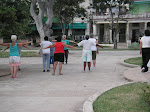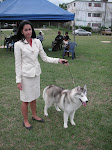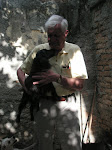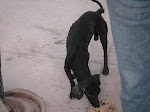Project Fidelity
Some animal rights people object to making dogs into servants of mankind. Seeing the use of dogs on chores for men as a form of slavery, they speak against seeing-eye dogs, St Bernard rescues in the Alps, or guard dogs—all long time jobs for man's best friend. But now that we know more about the many ways dogs can help us, the question of ethics in making them work for us is even more important to answer. Now dogs can sense the onset of an epileptic seizure, tend to someone with a PTSD episode, sniff out drugs and many other types of contraband. In short, dogs doing chores for a living is a much bigger subject than it was even a few years ago.
I started thinking about this ethical question years ago sitting in the lounge of a cruise ship preparing to float us from Miami and off to some island. Lined up on the dock were rows of passenger luggage and cargo. Men with handsome dogs loosed them on the cargo, and the dogs gave every item on the dock a thoroughgoing olfactory inspection. On detecting the scent of drugs, their training would have them signal their handlers to make a search of the bag or box. Fortunately no drugs were detected in the cargo that day.
OK, those dogs weren't being paid, and paying them would not help them. All they need is food and medical care and human companionship. Dogs will learn to do a huge variety of chores for people only because they have evolved to live in symbiosis with mankind.
Yes, since that day thousands of years ago when wolves found food after overcoming their fear of men as they drew near to the garbage dumps of people, wolves have been evolving into dogs and developing a mutually beneficial relationship with people.
How can putting dogs to work be slavery? Are not all creatures placed here for them to earn a living somehow? By finding ways for them to earn a living, isn't humankind actually helping his canine friends? Of course taking care of them and treating them as dear companions goes without saying, but that is all but assured by the natural affinity between the two species.
Given humane treatment for the dogs, which arises naturally in normal people, training and using a dog for service to humans is not cruel, not unnatural, and not unfair. It's really part of the natural evolution of both species. Thus, for me, I settled an old niggling ethical question that has consumed the thoughts of many animal rights people.
More recently, through our website, I met Davis Hawn, a most unusual man with a consuming interest in service dogs and service dog training.. He was planning his first trip to Cuba and had many questions about taking his service dog, Booster, to Havana with him. I could help a little, and Davis got his best answers from Bahamas Air which flew him to Cuba with an education exception to the Cuba travel restrictions. I helped him to meet Nora Garcia, Aniplant's President, and she helped him to publicize his ideas about service dogs and their training—something he calls Project Fidelity. Nora had connections to help him produce an informative, professional video piece on CD about Booster and service dogs in particular, and he appeared on Cuban television with Booster.
While in Cuba Davis found a stray dog on Obispo street in downtown Havana and decided to adopt him. He arranged for someone to foster him during the long wait for medical tests, paperwork, and shipping arrangements. Knowing some Cubans have cheated some traveling dog lovers out of money while providing poor or no foster care, I talked Davis into having Nora inspect the foster family and their home. Nora arranged for a different foster family and began the involved process of generating inoculations, medical certificates, and shipping arrangements to send the dog out of Cuba. Davis met Fidelity after a flight of a few hours to Toronto. They flew on to Chicago and then New Orleans area, their home.
And what is Project Fidelity, you ask? It's Davis' masters degree from Bergin University. Davis is proposing granting scholarships to Cubans to support sending young Cubans to Bergin University for an intensive course in training service dogs. These students, on completing their training would return to Cuba, each with a puppy for training, set about training other dogs and the people who need them. Training of people's pets could be undertaken too. Their new positions would be as paid employees of Aniplant. Davis has selected Aniplant to operate the program in Cuba. An ongoing program of training and encouraging the expanded use of service dogs is foreseen.
All this was packaged into a Master's Degree Thesis by Davis and submitted to Bergin University, and I, along with others, was asked by the University to review the thesis and offer comments. Needless to say, Davis got his Master's Degree, and he and Nora are now in the early stages of this exciting program. Scholarship recipients have been tentatively selected, and it appears their training will take place this summer.
I believe this program, Project Fidelity, will offer opportunities for useful, happy lives for many Cuban dogs, and the presentation of this program to the Cuban people by Aniplant and Nora will help assure that success.
Thanks Davis, Nora, Bergin University, and the scholarship recipients for your collaboration in this exciting program.
Les Inglis
Wednesday, January 25, 2012
Subscribe to:
Post Comments (Atom)






























































































No comments:
Post a Comment